Why Is Learning Through Play So Important?
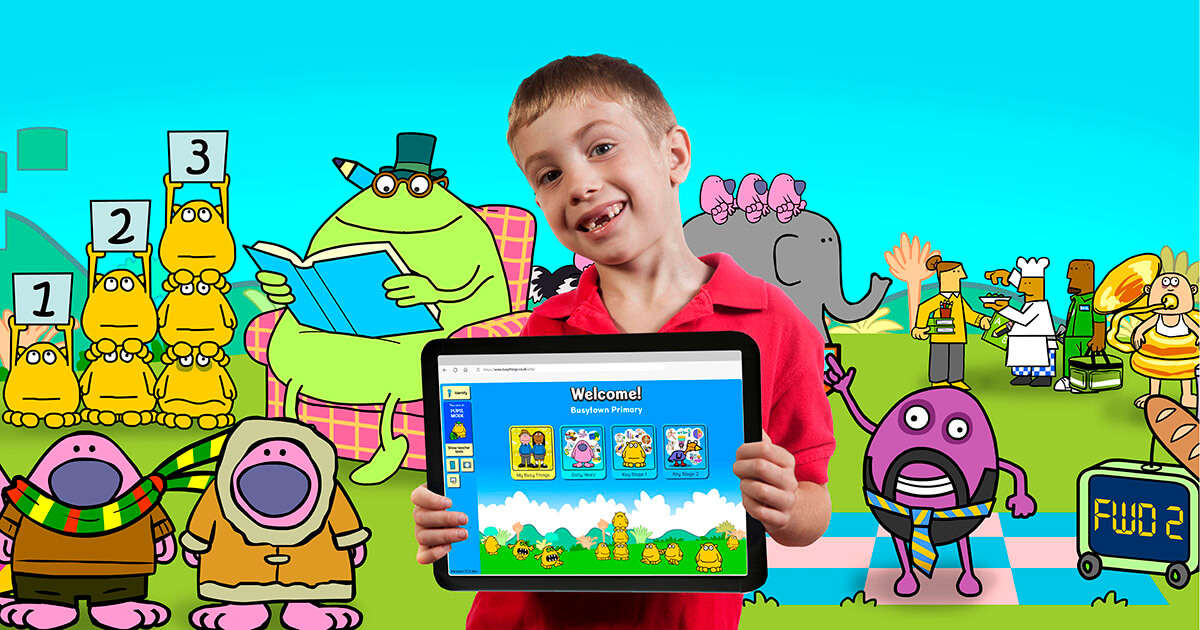
Play has always had a vital role in children’s development. But the pool of evidence supporting the concept of Learning through Play as the best way for children to learn and thrive has grown in recent years. Numerous studies by psychologists and educationalist have highlighted play’s profound impact on a child’s cognitive, social, emotional, and physical development. Learning through Play is now endorsed by globally respected organisations. These include the United Nations Children’s Fund (UNICEF) and the World Health Organization (WHO).
As huge supporters of learning through play ourselves – Busy Things’ motto is “Teach – Laugh – Learn” after all – we explore in this blog what Learning through Play means in practice, and how Busy Things’ activities support it. It looks at:
- What is Learning through Play?
- The Five Characteristics of Learning through Play
- How Busy Things supports Learning through Play
- How Busy Things supports Learning through Play in Early Years
- How Busy Things supports Learning through Play in Key Stage 1
- How Busy Things supports Learning through Play in Key Stage 2
- Summary and Free Trial
What is Learning through Play?
Learning through Play is essentially play as we’ve always known it. Through activities like building blocks, pretend play and puzzles, children engage in problem-solving, critical thinking and creative exploration. Play is one of the primary ways children make sense of the world around them.
What is now being confirmed, however, is that play lays the foundations for brain development and will help children acquire the 21st century skills they’ll need to thrive in secondary education and beyond. In a world where we have information at our fingertips, we need thoughtful, curious minds that are questioning, able to think critically, and test and learn different options, to navigate around an ever-changing world confidently. Learning through play is seen as having a vital role here that harnesses children’s natural curiosity to enable them to thrive socially, professionally and in every other way.
The Five Characteristics of Learning through Play
There are five characteristics of Learning through Play, which is also called playful learning. These are outlined below:

Children won’t necessarily experience all these characteristics in every ‘play-based’ activity they undertake, which is why they need lots of different kinds of play, indoors and outdoors. As a whole, the activities weave together to build a strong and flexible tapestry of skills, which the children can draw on throughout their lives.
How Busy Things supports Learning through Play
Busy Things offers joyful, iterative and actively engaging learning at all levels of early years and primary education. Our activities and games can be mixed effectively with physical and creative play. Enter any classroom playing Busy Things and the children’s excitement and enthusiasm for the content will be apparent. Packed full of funny characters and quirky humour, our games are specifically designed to bring joy to learning and encourage the children to explore and engage more deeply with the educational content.
It is also iterative, offering children a safe environment, in which to learn risk-free. Children can make as many mistakes as they need as they experiment with cause and effect, and test out different options without the fear of being judged.
Furthermore, Busy Things is actively engaging, involving the children on a physical and mental level. Busy Things’ activities require children to think, make decisions and interact with the technology, helping them fully immerse in their learning.
How Busy Things supports Learning through Play in Early Years
In the Early Years Foundation Stage (EYFS), play is the cornerstone of a child’s education. Children at this stage (3-5 years old) generally benefit from a lot of free play. This enables them to explore areas they are naturally curious about and build their knowledge organically. Play offers them a way to understand the world, develop language skills and build relationships with others.
Busy Things can play an important part at this stage and there are numerous examples of playful activities in the Early Years’ section of Busy Things.
Many of our Early Years games are open-ended, with no right or wrong answer. They help the children to build confidence and feel comfortable in their own decision-making.
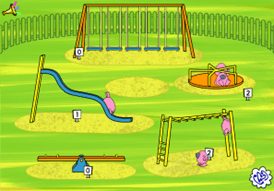
One such playful activity is our maths activity, Playground, which helps children learn about numbers and basic number bonds.
By dragging and dropping the pink men onto different playground apparatus, the children can experiment and see what happens.
The fact that the game is set in a familiar setting helps the children connect their learning to real-world experiences.
Try ‘Playground‘ free here!
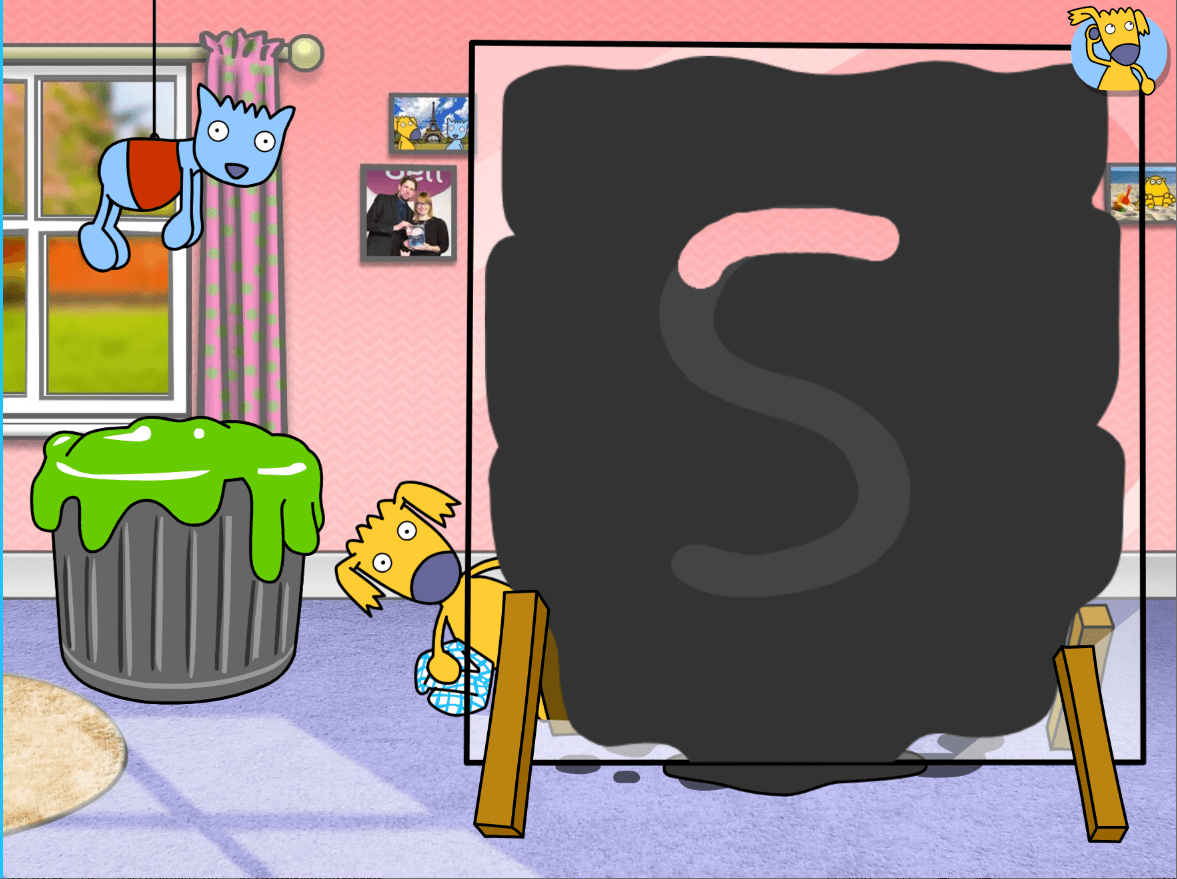
In a similarly playful way, the mark-making activities on Busy Things grow, test and reinforce the children’s knowledge of the letters of the alphabet.
Squeaky clean is one of these. It’s a tactical activity that simulates the sound of drawing on a steamed-up window.
It’s great on the interactive whiteboard, and can also be used to reinforce turn-taking and sharing!
Try ‘Squeaky clean‘ free here!
How Busy Things supports Learning through Play in Key Stage 1
Busy Things offers a wide selection of games and activities for all subjects at Key Stage 1, which all link to the National Curriculum.
These playful activities support the academic goals, making it easier for children to grasp new concepts and build on them. They also make learning enjoyable – crucial for maintaining children’s enthusiasm and interest.
Phonics activities are key at this level and Busy Things includes a whole range of systemic synthetic phonics resources.
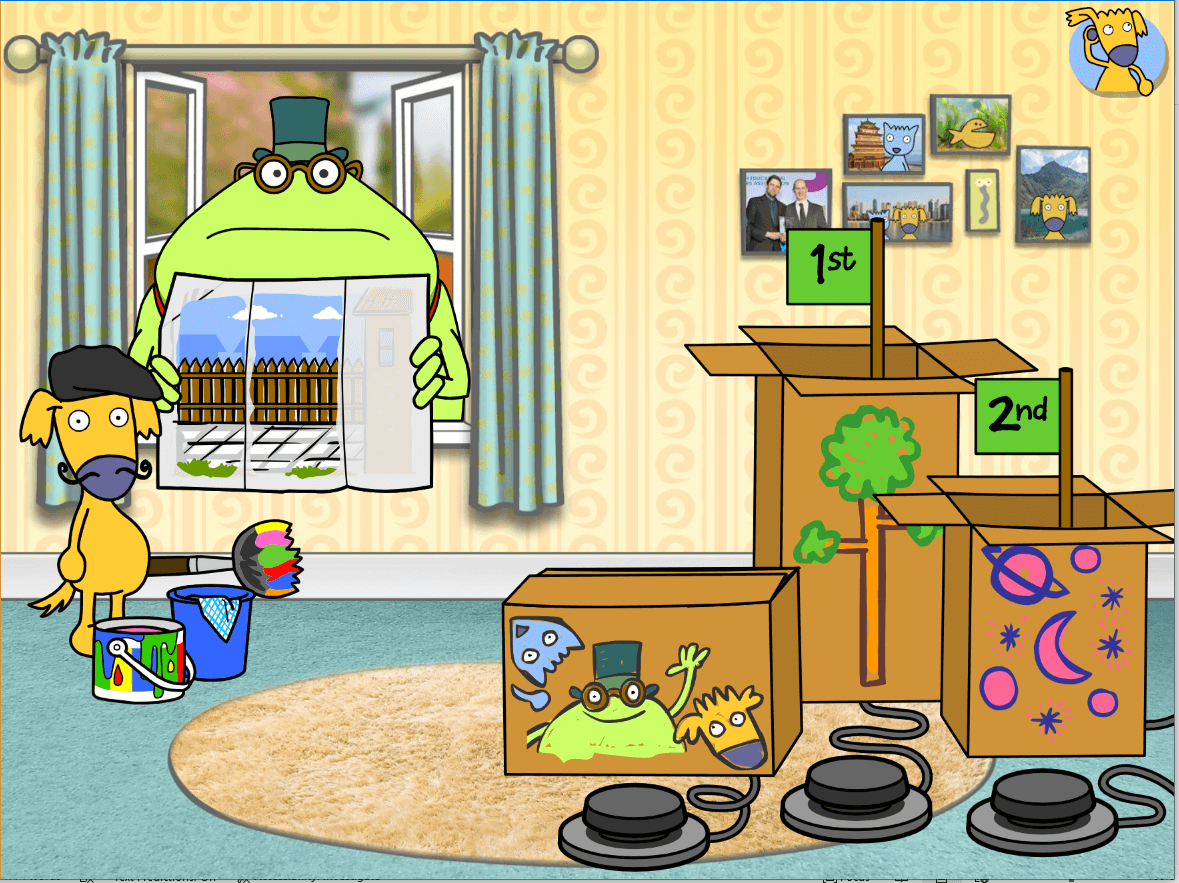
From sound discrimination and rhyming to blending and segmenting, there are activities and games galore. And, if you want to take the learning away from the screen, our customisable Resource maker.
Teachers can quickly customise both games and worksheets to focus on particular phonemes and/or graphemes.
Find out more from our earlier blog and try our ‘Build the word‘ activity here!
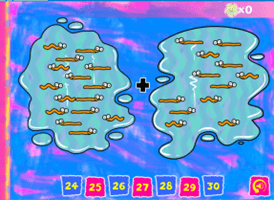
Play at this stage also helps with social and emotional development. Our Busy Box game for instance (left) features cross-curricular mini-games and a school-based leaderboard to encourage competition.
This supports collaboration and encourages perseverance, as well as being motivational.
How Busy Things supports Learning through Play in Key Stage 2
By the time children reach Key Stage 2, play continues to play a crucial role, although the nature of play-based learning becomes more sophisticated. At this stage, children are expected to tackle more complex concepts in English, maths, science, geography and history. However, incorporating play into learning remains important for keeping children engaged and making abstract concepts more accessible.
Busy Things caters to Key Stage 2 learners with a variety of meaningful, actively engaging and iterative activities that challenge children to think critically and apply their knowledge in fun and creative ways. For instance, some of our maths games, like Miner birds, test strategic thinking as well as mathematical concepts.
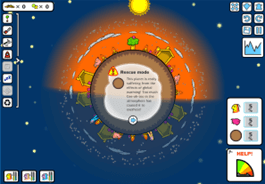
Similarly, some of our science activities, such as Tree World (right), are simulations, which allow children to explore scientific principles in a hands-on way. These activities encourage children to experiment, hypothesise and explore, which are all key to the Key Stage 2 curriculum.
Play ‘Tree world‘ here free!
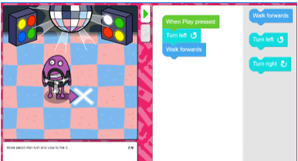
Another good example would be our Busy Code activities, which teach children to write, test and debug block-based programs.
They are a great first step into code, and support making mistakes as part of the learning process!
Play the first activity of the series, ‘Tutorial 1: The basics’ here, and read more about our Coding activities here!
Summary and Free Trial
Play has always featured heavily in primary years education, especially in Ealy Years classrooms, and is something that Busy Things has fervently endorsed. It makes sense that learning becomes more rewarding if it’s enjoyable. Knowing that playing playful activities like ours builds the skills needed for children to thrive in tomorrow’s fast-paced technological world is amazing!
In this blog, we’ve highlighted how our activities and games support Learning through Play and the five characteristics – joyful, meaningful, actively engaging, iterative and socially interactive – intrinsic to it.
As part of this, we’ve included activities for each key stage, which we’ve made free to play for a limited time. Simply click the hyperlinks to access them. When playing, we’d recommend involving the children too. That way, you’ll see how they love to explore independently and develop in confidence as they navigate around, have fun and learn.
Interested to see more activities?
We hope this blog has given you a taste of what Busy Things provides, and would love for you and your teaching colleagues to see more. If that sounds good to you, why not sign up for a no-obligation free trial? You’re welcome to share the login details within your school and it will give you 28 days to try out more of our award-winning educational activities and games!